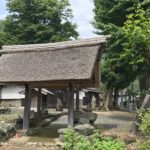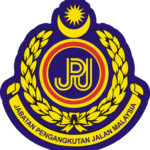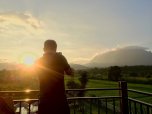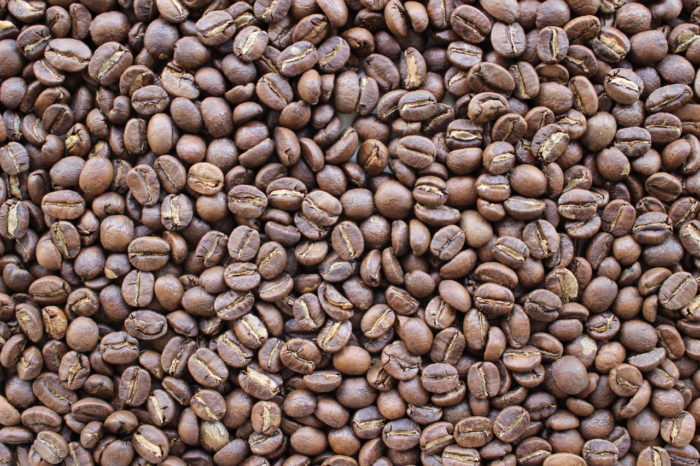
P’Jaroon: Washed / Photo: by the courtesy of Left Hand Roasters
[日本語に変更]
Contents
Chiang Mai Based Small-batch Roaster
Chiang Mai is an attractive city in northern Thailand, not only for its historical heritage, but also for its coffee culture and high quality cafes. As an artisan coffee roastery started in Chiang Mai, Left Hand Roasters has been attracting coffee lovers’ attention.
Since they roast small-batch, Left Hand Roasters focuses on selling beans via their online store. Even less than a year after the launch, they were already featured in the local Thai media as “Thailand’s best-value-for-money coffee subscription“, and is steadily gaining a presence in the coffee industry. In deed, several Michelin-starred restaurants in Bangkok serve their coffee as house special, and that loudly speaks of its quality and potential of the roastery.
Mr. Dustin Joseph, a founder and head roaster of Left Hand Roasters, is a top chef who has an amazing sense of taste with an impressive culinary skills. He has been involved in the launch and staff training at several prestigious restaurants, providing them his professional expertise.
He has also travelled to dozens of countries around the world to research and write on cultural anthropology from the perspective of food culture. He is full of passion about food and that is clearly reflected in his work at Left Hand Roasters.
I met with Dustin a while ago and asked him about the coffee producers whom he has been dealing with, and his passion for roasting. Here I’m sharing some of them.
AD
Deep Trust with Local Coffee Farmers
Left Hand Roasters has the objective in their business; to produce quality coffee while supporting the needs for the local farmers. For this purpose, they only purchase the beans from Chiang Mai, Chiang Rai, and Mae Hong Son region -all in northern Thailand-, and buy their beans directly from small family-owned farms.
Dustin says that in order to build a relationship of trust with the farmers, he visits their farms many times to see what’s really happening there and maintains good communication with them. (Dustin is American, but speaks fluent Thai :))
Coffee Plantation Surrounded by Cherry Trees
The photo below shows P’See and P’Jaroon, one of the coffee producers that Left Hand Roasters buys beans from. (Dustin is in the centre) The farm in this photo is located at 1,200 to 1,300m (4,000 to 4,300ft) above sea level. It’s a beautiful environment –cherry trees lining as shade trees (creating shade for the coffee to avoid direct sunlight). Interestingly, this place used to be a tea plantation to produce oolong tea for hundreds of years before it turned to be a coffee farm.
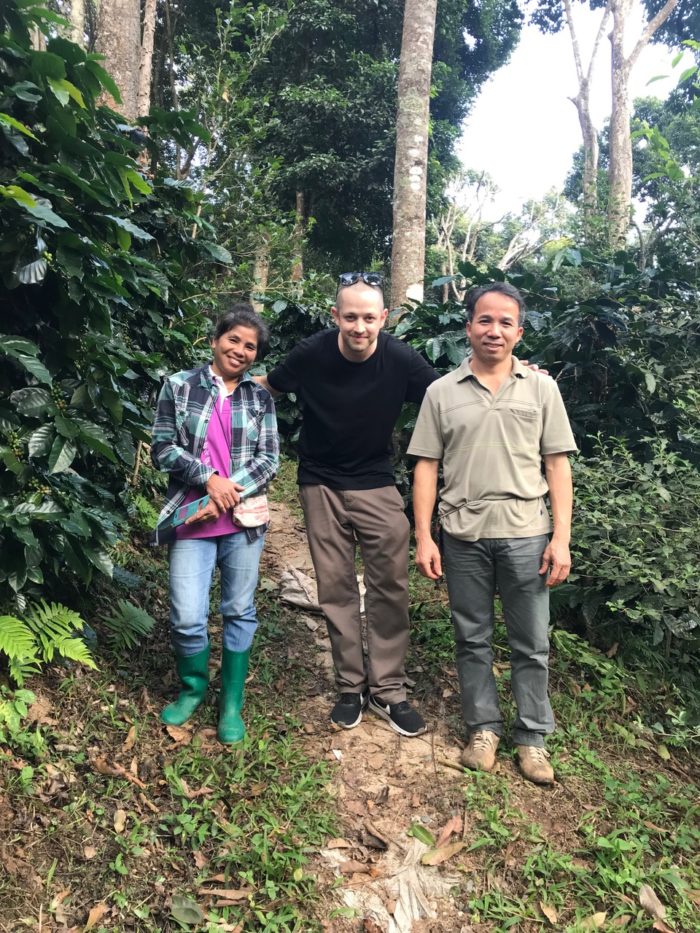
Coffee producer P’See & P’Jaroon / Photo: by the courtesy of Left Hand Roasters
P’See’s farm produces a wide variety of coffees as shown in the photos below. Dustin says that there is always interesting discovery when he walks around the farm and pays close attention to the surroundings.
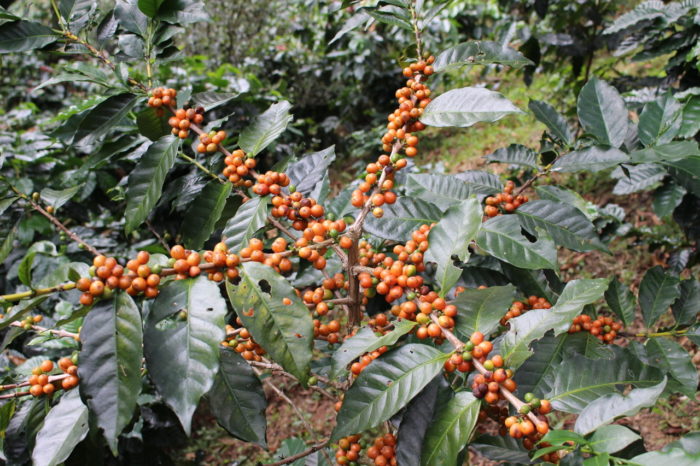
Orange Bourbon / Photo: by the courtesy of Left Hand Roasters
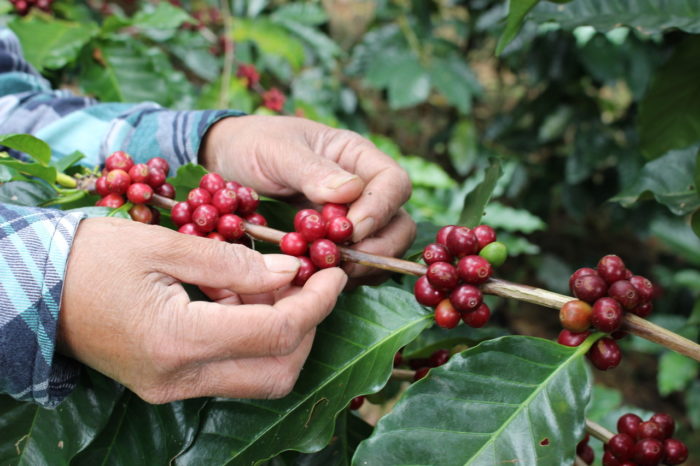
Catimor / Photo: by the courtesy of Left Hand Roasters
P’See’s Black Honey, which is being processed with care, is one of Dustin’s favourite coffees as a roaster. He passionately explains, “The key is to bring out the flavour of the black honey just as much as possible. But you have to be very very careful not to burn it because its sugar content is high.”
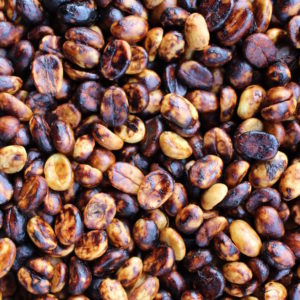
Photo: by the courtesy of Left Hand Roasters
Lisu Coffee Plantation -From Poppy to Coffee
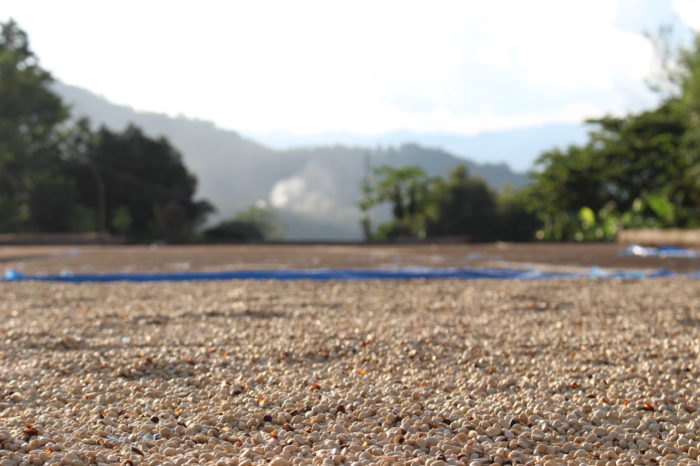
Khun Abae’s farm / Photo: by the courtesy of Left Hand Roasters
The above photo shows Khun Abae of the Lisu tribe drying parchment beans at his coffee farm. The area is located at around 1,500m (4,900ft) above sea level and you can enjoy a peaceful scenery looking at the Doi Chaang mountains. However, until recently, the main source of income in this region called “Golden Triangle” was from growing poppy -raw material for opium.
The turning point was the Royal Project initiative by the Thai royal family. The project was designed to provide technical assistance to hill tribes and other local people, and to introduce agricultural products. As a result, the region is now known as a leading producer of macadamia nuts besides coffee, and the negative impression of the region is slowly but surely becoming a thing of the past.
The Oldest Arabica Coffee Farms in Thailand
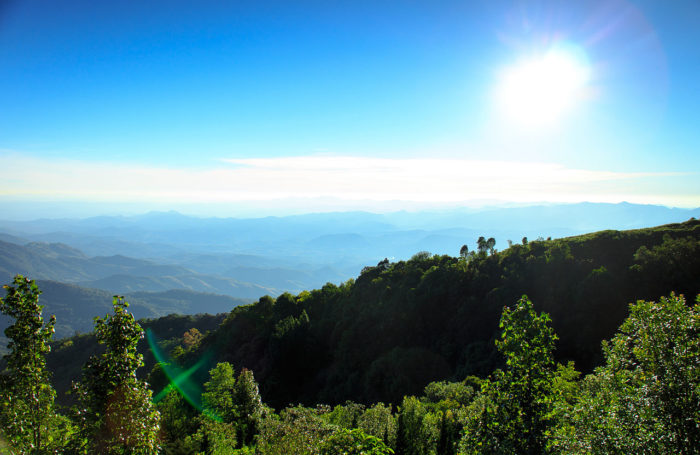
Doi Inthanon National Park by Lester Mathias Andersson
Mt. Doi Inthanon (2,565 m above sea level), the highest mountain in Thailand, is located about 90km (56mi) southwest of Chiang Mai City. The cultivation of Arabica coffee in Thailand began in this beautiful area, which is also designated as a national park.
Below photo shows two farm producers at Lapato Organic Coffee Farm in Doi Inthanon. Dustin is here explaining them how their coffee beans are roasted, showing the roasting profiles such as time, temperature, etc. P’Kwiv (pictured in the middle) manages a few farms and handles the coffee processing himself.
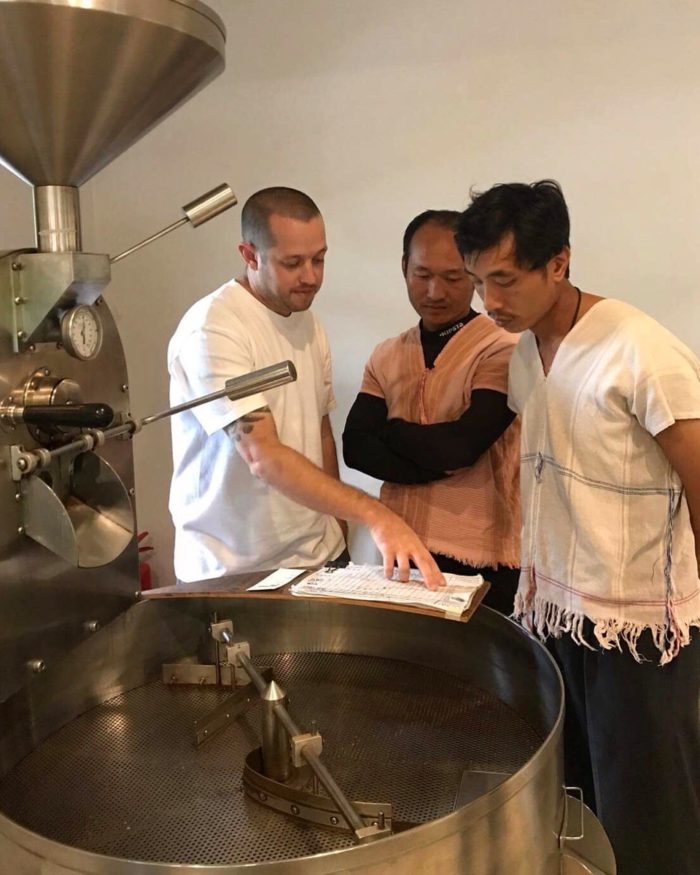
Close communication with farm producers / Photo: by the courtesy of Left Hand Roasters
Left Hand Roasters: Their Roasting
You may have the experience that some coffees taste good on the first sip but leave somewhat unpleasant flavour on the tongue, or a certain characteristic stands out too much. But I find that the aftertaste of the beans of Left Hand Roasters is very well-rounded and balanced. They offer beans processed with a different kind of methods, including washed, natural, and honey process. They are carefully roasted so as to bring out the best of each bean while providing pleasant and lingering aftertaste.
Personally, I especially like their Black Honey. The method of Black honey gives the beans a very rich flavour. But depending on how it’s roasted, the aroma could end up being too strong and balance might be lost, or the sweetness and fragrance of black honey may not be as noticeable as it should be. Left Hand Roasters’ Black Honey is an excellent roast that is rich and sweet, but not heavy, while it has a beautiful distinctive character of honey processing. It’s a pleasant experience from the moment you sip it through all the way to the long-lasting aftertaste.
One more thing; the roasting machine used at Left Hand Roasters (see photo below) was actually built by Dustin’s father, who is an engineer. Even though it’s a self-build roaster, there’s no compromise on function and quality. In fact, the performance of this hand-build roaster is superior in many ways than those professional-grade machines in the market.
For example, it has a much larger-than-usual cooling basket with a powerful fan to quickly reduce the temperature of the beans after roasting. Dustin said that when people in the coffee business come to his place and look at the machine, they all are so impressed seeing its great performance and capability. And you can certainly understand the level of perfection when you taste the beans roasted with this machine.
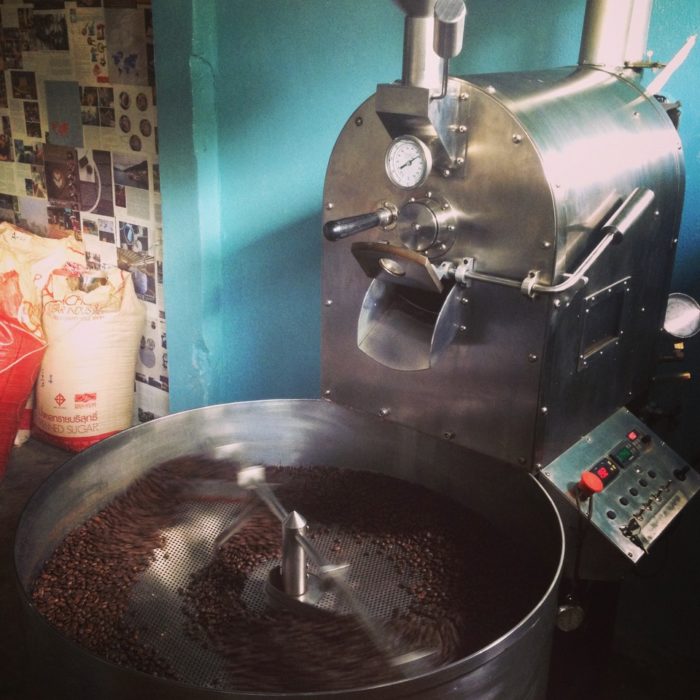
Coffee roaster built by Dustin’s father / Photo: by the courtesy of Left Hand Roasters
Left Hand Roasters: Where Can I Buy Their Beans?
Individual customers can buy from Left Hand Roasters only through their online store. For international shipments, they are in the process of making detailed adjustments to the number of days required for delivery, conditions during transportation, and other factors so that they can send their beans without compromising its quality while keeping costs low.
(Please contact Left Hand Roasters directly to find out the availability of shipping to your country or region.)
Although Thai coffee is not yet well-known in the international market, the quality of the beans produced at the carefully managed farms is no less than that of specialty coffees from well-known coffee producing countries.
Left Hand Roasters is more than capable of bringing out the charm of such carefully selected coffee beans from northern Thailand. It won’t be that long before their goal becomes a reality –to introduce high quality Thai coffee to the whole world.
* See “Tasting Notes” below for more information on the beans of Left Hand Roasters (Text written in Japanese, the flavour wheel in English).
<For Inquiry>
Left Hand Roasters
Official Web Site: https://lefthandroasters.com/


